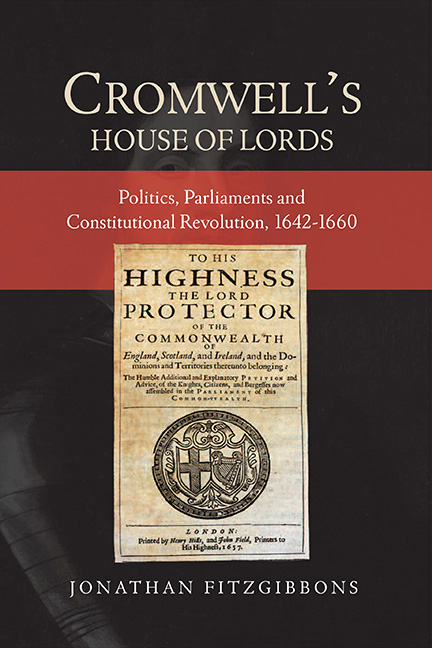Book contents
- Frontmatter
- Contents
- Acknowledgements
- Abbreviations
- Introduction
- 1 Parliamentarian Thought and the Abolition of the House of Lords, 1642–49
- 2 Oliver Cromwell, the Other House and the Humble Petition and Advice
- 3 The Membership of the Other House
- 4 The Other House and the Second Session of the Second Protectorate Parliament
- 5 Richard Cromwell, the Third Protectorate Parliament and the Other House Debates
- 6 The Other House, the Army and the Search for a Settlement
- Conclusion
- Appendix: The Membership of the Other House
- Bibliography
- Index
- Studies in Early Modern Cultural, Political and Social History
6 - The Other House, the Army and the Search for a Settlement
Published online by Cambridge University Press: 05 May 2018
- Frontmatter
- Contents
- Acknowledgements
- Abbreviations
- Introduction
- 1 Parliamentarian Thought and the Abolition of the House of Lords, 1642–49
- 2 Oliver Cromwell, the Other House and the Humble Petition and Advice
- 3 The Membership of the Other House
- 4 The Other House and the Second Session of the Second Protectorate Parliament
- 5 Richard Cromwell, the Third Protectorate Parliament and the Other House Debates
- 6 The Other House, the Army and the Search for a Settlement
- Conclusion
- Appendix: The Membership of the Other House
- Bibliography
- Index
- Studies in Early Modern Cultural, Political and Social History
Summary
It was widely assumed by contemporaries that the Other House was a bastion for the military interest. Writing to Cardinal Mazarin on 24 February 1659, the French Ambassador Bordeaux reported how the army officers were pleased with ‘the new House of Lords’ because it was ‘composed of the principal officers’, allowing them ‘to secure the balance of authority in themselves’. As demonstrated in the previous chapter many of the Republican and crypto-Royalist tirades against the Other House concerned its military character. Consequently, this characterization permeates much of the historiography. Firth, in particular, suggested that the ‘maintenance of the other House was essential’ to the army officers ‘as a guarantee of their own influence’. Although he noted that the officers ‘were not the majority’ in the Other House, Firth deferred to the contemporary view that ‘they were at all events the preponderating influence there’.
Doubtless, in the early modern period contemporary perceptions were often more important for driving events than political realities. After all, it was Charles I's perceived duplicity and misgovernment, whatever the realities of his rule, that galvanized opposition to his reign. Similarly, the perceived military dominance of the Other House focused opposition to the new chamber and the Cromwellian regime as a whole. Yet, as already demonstrated in Chapter 3, the membership of the Other House summoned by Oliver Cromwell, was more balanced than previously realized. If anything, it was the civilian Cromwellians and conservatives who had the majority.
- Type
- Chapter
- Information
- Cromwell's House of LordsPolitics, Parliaments and Constitutional Revolution, 1642–1660, pp. 195 - 229Publisher: Boydell & BrewerPrint publication year: 2018

